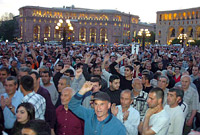It turned out that Armenians associate the word “dashink” (alliance) with the union of the weak. Perhaps only “Unity” can be considered an exception, but it is a unique phenomenon. We can talk about it separately and for a long time.
Armenian political parties ponder about becoming allies when they feel alone and unprotected and the reason they feel alone and unprotected is that they don’t think about anything else besides seizing power. They practically don’t work in between elections, or work only on keeping their presence. They do that by giving interviews to small-print newspapers, the “Azatutyun” radio station, participating in different types of seminars and conferences (mainly nonsensical), and they sometimes hold rallies in central Yerevan, and the number of participants is considerably lower than what the newspapers print.
During all of the above-mentioned events they say that they need to reinstate constitutional order in the country, and come to the conclusion that it is necessary to eliminate the ruling elite in order to do that. The people must realize the need for that in order for the ruling elite to leave. In order for the people to realize the need for the ruling elite to leave, the people must understand a couple of issues, and in order for the people to understand those issues, somebody (or some people) must explain those issues. In order for them to explain this, the people must have access to that information.
There are a couple ways of accessibility. The first is direct contact – the politician visits any district and talks with the villagers. This is rather expensive, but if we take into consideration that one minute of airtime cost 80,000 drams during the pre-election period, we could say that it is not that expensive. You can organize at least three campaigns with 80,000 drams and directly communicate with at least 4,000 residents of eight to ten villages. It turns out that the political party that has something to say to the people must spend twenty drams for communicating with one citizen. It will need nearly ten million drams to communicate with half a million people. Direct contact may have a positive end-result if what the party has to say is meaningful and grounded. It is very hard to explain to people, especially the residents of the villages, that change of rule may lead to positive end results. They (especially the elders) are living with the nostalgia of the olden days and consider themselves the victims of change of rule.
The next version is the printed press which, as we already mentioned, has a very modest audience. We can surely claim that there are random people who use the “service” of the press outside of Yerevan, and they are mainly local officials. Each opposition party has tried at least once to have its own newspaper, but they were uninteresting and short-lived. Opposition parties have never taken the initiative to create a free press or carry out a program of consistently helping the existing periodicals.
The third and most powerful means of accessibility for the people is television, which is consistently controlled by the authorities. The authorities keep the monopoly of information at any price. The oppositionists do not try in any way to break the barrier.
Oppositionists could have united with the motive of accessibility for the people and that would be the unity of parties not against the existing authorities, rather in the name of the people, because the people must have the opportunity to hear at least two sides in order to make the right choice.
It would be much easier to create this kind of alliance because the ambitions of this or that oppositionist become unimportant on the road towards reaching freedom of speech. All sign under one document by which they agree to participate in neither the parliamentary nor presidential elections in the absence of freedom of speech. A mandatory condition of participation is set for at least one liberal television station, with the possibility of having free access to other channels (including regional) and the precision of etiquette of the elections in general.
Now (for how many times) it turns out that Armenian oppositionists accept the rules of the pre-election game on their own or by an alliance, step out of the struggle and cause scandals, saying that the elections were not free, fair and transparent.
Elections are the main precondition for democracy, but democracy is an empty phrase without freedom of speech, and the elections are simply another event. If you participate in the elections without demanding your right of freedom of speech, then you consider that you deserve the democracy that you have. After that, nobody is going to believe that the opposition could have changed something. Boris Frlets, head of the OSCE observatory mission of the Armenian parliamentary elections, would have all the grounds to think that Armenia had fulfilled its obligations of the OSCE to secure a free press. He has the right because nobody refused the rules of the game obligated by the authorities and nobody refused the perspective of having a small corner in the National Assembly.

